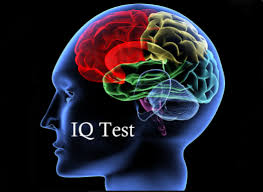How Much Useful is IQ Test?
by Yusuff Ademola A.
The use of
Intelligence test is a controversial issue which has attracted the attention
of parents and school administrators. Parents want the best education for
their children. Therefore, they are eager to know the level their children
belong. Similarly, the school administrators are under pressure to make sure
that students perform well in standardized tests. Hence, it makes sense that
schools conduct intelligence test to assess students’ learning potentialities
and try to improve the standard of education.
For this reason,
intelligence test has become most widely used tool. The effectiveness of a
testing tool depends on the skill, scientific knowledge and competency of its
users. It is not mainly for categorizing or labeling, but rather, to know the area
of strength and weaknesses of each student.
Intelligence
Quotient (IQ) test has various strengths which benefit the school, teacher,
parents and students alike. Nevertheless, IQ test has received numerous
criticisms, which majorly might affect the students with learning disabilities. Some of these limitations and criticisms include
labeling, lack of diversity and the issue of validity of IQ tests.
The Merriam
Webster dictionary defines IQ as: “A number that represents a person’s level of
intelligence based on the score of a special test.”
From a medical
dictionary, IQ is defined as: “A number used to express the apparent relative
intelligence of a person based on the results of standardized testing.”
Thus, IQ tests
are standardized tests which are administered to know the level of intelligence
of a person. Examples of IQ tests include Stanford – Binet Intelligence scale,
Wechsler intelligence scale, Kaufman assessment battery for children, and Reynolds
intellectual assessment scales.
IQ tests
identify gifted students and those who need extra attention. This is one of the
strengths of IQ tests. IQ tests can be administered on children as early as
pre-school. It helps teacher to divide students into groups sharing equal level
of ability and to identify children at risk.Identifying
students with below average IQ will help teachers and school administrators to
provide extra attention and accommodations for such students.
The result of IQ
test can be used to determine the students with learning
difficulties, which consequently will help in adjusting the learning techniques
to fit the students. It will also help for referral – to any therapist or
medical practitioner – in case there is need for any, and for selection of right
intervention.
IQ tests
identify potentiality for academic achievement and consequently benefit the
society. It helps teachers and parents to maximize the skills of the students
who score high on IQ test. This helps society keeps a steady supply of people
who can provide benefits to the society.
Other strengths
of IQ tests include prediction of success in a variety of activities,
measurement of students’ ability to perform socially and academically,
provision of a standardized method of comparing students’ abilities and
performance, and help to tailor education to individual needs.
IQ test has
received numerous criticisms and limitations; which its outcome majorly affect
the students with learning disabilities. Some of these limitations are
discussed below.
Scoring below
average in IQ test causes discrimination by labeling students as dull or
stupid. This is one of unethical practices which arise as a result of IQ test
score. Labeling affects both who score high and below average in IQ test; if a
student is always told that he is smart, he might assume that everything is
easy, and perhaps, will give up whenever he comes across a difficult task. Similarly,
a child labelled dull or stupid – due to his low performance in IQ test – is
also likely to give up on many tasks because he might feel that he is dull and
cannot achieve his goals.
IQ test limits
student potential and perpetuate stereotypes within a classroom setting. Greg
Machek of Indiana University notes in a paper titled "Brief History of the
Measurement of Intelligence" that minorities and economically-challenged
typically score worse than the better-off, white counterparts. Upon receiving
the result of a poor IQ test, a student may believe that she is
"stupid" or less intelligent than her peers when it is not her fault.
Similarly, better-off students with better scores might look down or unfairly
class other students because of their scores.
IQ test does not
measure overall competence of students. IQ test does not consider multidimensional
nature of intelligence. Therefore, it does not test all situations that show
intelligent behaviors; such as competence in social situations, positive
relationship and creativity.
Scoring high or
below average score in IQ test does not accurately predict success or
failure in the future. Robert Sternberg, who is known for his Triarchic Theory
of Intelligence, did poorly on intelligence test as a schoolboy, yet he is now a Professor of Psychology at Yale University.
Questions have
been raised regarding how important and valid IQ test is, and what exactly it measures. Howard Gardner identified seven different forms of intelligence, but
IQ test typically measures only verbal and mathematical abilities. IQ test does
not measure patience, fortitude and desire to succeed which are more important
qualities than mere intelligence.
In conclusion,
it is understood that IQ test is an important tool which can be used to measure
the strengths and weaknesses of students. Therefore, it helps teachers and
parents to maximize students' skills and provide right intervention in the areas of
their weaknesses. Nevertheless, IQ test also has numerous limitations, but despite
of its limitation, it provides important information about the individuals when
used properly by a trained and expert psychometrist.
Thank you for reading.









Comments
Post a Comment